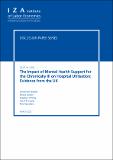| dc.contributor.author | Gruber, Jonathan | |
| dc.contributor.author | Lordan, Grace | |
| dc.contributor.author | Pilling, Stephen | |
| dc.contributor.author | Propper, Carol | |
| dc.contributor.author | Saunders, Rob | |
| dc.date.accessioned | 2022-08-29T15:40:32Z | |
| dc.date.available | 2022-08-29T15:40:32Z | |
| dc.date.issued | 2022 | |
| dc.identifier.uri | https://hdl.handle.net/1721.1/144481 | |
| dc.description.abstract | Individuals with common mental disorders (CMDs) such as depression and anxiety frequently have co-occurring long-term physical health conditions (LTCs) and this co-occurrence is associated with higher hospital utilisation. Psychological treatment for CMDs may reduce healthcare utilisation through better management of the LTC, but there is little previous research. We examined the impact of psychological treatment delivered under the nationwide Improving Access to Psychological Therapies (IAPT) programme in England on hospital utilisation 12-months after the end of IAPT treatment. We examined three types of hospital utilisation: Inpatient treatment, Outpatient treatment and Emergency Room attendance. We examined individuals with Chronic Obstructive Pulmonary Disease (COPD) (n = 816), Diabetes (n = 2813) or Cardiovascular Disease (CVD) (n = 4115) who received psychological treatment between April 2014 and March 2016. IAPT episode data was linked to hospital utilisation data which went up to March 2017. Changes in the probability of hospital utilisation were compared to a matched control sample for each LTC. Individuals in the control sample received IAPT treatment between April 2017 and March 2018. Compared to the control sample, the treated sample had significant reductions in the probability of all three types of hospital utilisation, for all three LTCs 12-months after the end of IAPT treatment. Reductions in utilisation of Emergency Room, Outpatient and non-elective Inpatient treatment were also observed immediately following the end of psychological treatment, and 6-months after, for individuals with diabetes and CVD, compared to the matched sample. These findings suggest that psychological interventions for CMDs delivered to individuals with co-occurring long-term chronic conditions may reduce the probability of utilisation of hospital services. Our results support the roll-out of psychological treatment aimed at individuals who have co-occurring CMDs and long-term chronic conditions. | en_US |
| dc.language.iso | en | |
| dc.publisher | Elsevier BV | en_US |
| dc.relation.isversionof | 10.1016/J.SOCSCIMED.2021.114675 | en_US |
| dc.rights | Creative Commons Attribution-NonCommercial-NoDerivs License | en_US |
| dc.rights.uri | http://creativecommons.org/licenses/by-nc-nd/4.0/ | en_US |
| dc.source | Other repository | en_US |
| dc.title | The impact of mental health support for the chronically ill on hospital utilisation: Evidence from the UK | en_US |
| dc.type | Article | en_US |
| dc.identifier.citation | Gruber, Jonathan, Lordan, Grace, Pilling, Stephen, Propper, Carol and Saunders, Rob. 2022. "The impact of mental health support for the chronically ill on hospital utilisation: Evidence from the UK." Social Science and Medicine, 294 (15181). | |
| dc.contributor.department | Massachusetts Institute of Technology. Department of Economics | |
| dc.relation.journal | Social Science and Medicine | en_US |
| dc.eprint.version | Original manuscript | en_US |
| dc.type.uri | http://purl.org/eprint/type/JournalArticle | en_US |
| eprint.status | http://purl.org/eprint/status/NonPeerReviewed | en_US |
| dc.date.updated | 2022-08-29T15:37:21Z | |
| dspace.orderedauthors | Gruber, J; Lordan, G; Pilling, S; Propper, C; Saunders, R | en_US |
| dspace.date.submission | 2022-08-29T15:37:22Z | |
| mit.journal.volume | 294 | en_US |
| mit.journal.issue | 15181 | en_US |
| mit.license | PUBLISHER_CC | |
| mit.metadata.status | Authority Work and Publication Information Needed | en_US |
